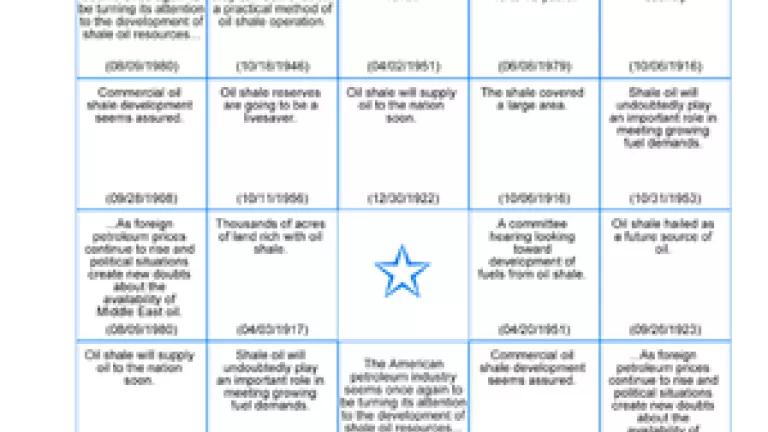
House leadership is risking our environment and the nation’s infrastructure by placing bets on a nonexistent industry
Last Thursday, Speaker of the House John Boehner and other Republicans released a package of three new energy bills that would create a 5-year plan to divert revenues collected from oil and gas drilling into the federal Highway Trust Fund to pay for transportation infrastructure. All too predictably, the proposals would gut longstanding environmental safeguards while also opening iconic landscapes such as the Arctic National Wildlife Refuge to new drilling operations.
One of these bills would force the federal government to open up millions of acres of federal lands for the commercial leasing of oil shale. This might be arguably one of the more fantastical parts of this package given that there is literally no such thing as a commercial domestic oil shale industry to speak of. And the notion that if only we streamlined the federal rules governing oil shale leasing, a commercial industry would emerge instantaneously to provide the needed funds in short order, sparks the question of whether Speaker Boehner and his allies are even serious about their proposal.
Given the Congressional hearings that took place last week on these bills, the evidence points to the fact that House leadership are indeed not being realistic, and are choosing instead to pander to the Drill Baby Drill crowd. One of those hearings took place on Friday in the House Subcommittee on Energy and Mineral Resources, for an oil shale bill introduced last week by Colorado Rep. Doug Lamborn. Titled the “PIONEERS Act," Lamborn’s bill would undermine the current federal program governing oil shale resources by giving away millions of acres of federal land that contain oil shale resources to the fossil fuel industry.
In the hearing for the PIONEERS Act, Republicans stuck to the notion that an oil shale industry would thrive only if we eliminated government regulation and interference from environmentalists. This ignores the fact that oil shale – which is literally a solid rock that contains oil-like substances – has never been successfully commercially developed (despite over a century of concerted efforts). This promotion of oil shale could be likened to the alchemists of yore, who often thought they were only steps away from turning common materials into gold – the only difference between them and many of the current promoters of oil shale is that these oil shale alchemists are trying to do something that has proven as nearly impossible: turning solid rock into oil.
Unfortunately, the House Republicans are fixated on oil shale and consequently have held a number of hearings in the last year touting that the United States can become the “Saudi Arabia of oil shale.” In order to underscore the myths that have been repeatedly perpetuated at these hearings, the Checks and Balances Project came up with the handy Oil Shale Bingo Card that captures the most overused oil shale myths. If you did end up scoring at home last week for the PIONEERS Act hearing, it would not have taken long before your bingo card was fully checkered.
Maybe what is most remarkable about the Republicans’ promotion of oil shale is that they are not even listening to industry backers of the oil shale industry at these hearings – who have said that efforts like the PIONEER Act are premature and even counterproductive given that there will not be an oil shale industry anytime soon. Industry giant Shell, the biggest backers of oil shale, has publicly commented that a viable commercial oil shale industry is decades away due to significant technological hurdles. And given that oil shale is such a tenuous proposition, there is great concern amongst many in the industry that any intervention to “promote” oil shale by Congress would only undermine current research efforts.
Dr. Jeremy Boak, a professor who heads the industry-sponsored Center for Oil Shale Technology and Research at the Colorado School of Mines, told the trade publication Greenwire last week that, “"It isn't obvious to me yet that we need to be putting a bunch of commercial leases out there because no one has a commercial process yet. And [industry] admits that," Boak said. "I don't see anybody eager to go out and lease land now when they're still running experiments."”
Similarly, RAND energy expert Dr. James Bartis testified in June at a Congressional hearing, “It would not be advisable to develop detailed regulations that would pertain to full-blown commercial development until more information is available on process performance and impacts.” At a different Congressional hearing that week, Dr. Bartis also said, “I see no reason to promote oil shale as above other promising areas for advancing technology and creating jobs.”
While there is a need to come up with a bipartisan approach in securing adequate funding for responsible transportation programs, promoting more drilling as a solution for bridging the funding gap is extremely counterproductive. However, that bad idea would be compounded if we started to depend upon the generation of revenues from an oil shale industry that exists as nothing more than a pipedream.

